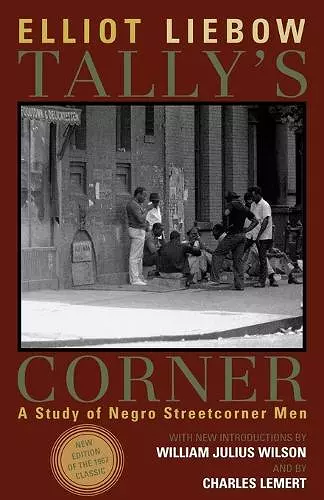Tally's Corner
A Study of Negro Streetcorner Men
Format:Paperback
Publisher:Bloomsbury Publishing PLC
Published:8th Jul '03
Currently unavailable, and unfortunately no date known when it will be back

The first edition of Tally's Corner, a sociological classic selling more than one million copies, was the first compelling response to the culture of poverty thesis—that the poor are different and, according to conservatives, morally inferior—and alternative explanations that many African Americans are caught in a tangle of pathology owing to the absence of black men in families. The debate has raged up to the present day. Yet Liebow's shadow theory of values—especially the values of poor, urban, black men—remains the single most parsimonious account of the reasons why the behavior of the poor appears to be at odds with the values of the American mainstream. While Elliot Liebow's vivid narrative of "street-corner" black men remains unchanged, the new introductions to this long-awaited revised edition bring the book up to date. Wilson and Lemert describe the debates since 1965 and situate Liebow's classic text in respect to current theories of urban poverty and race. They account for what Liebow might have seen had he studied the street corner today after welfare has been virtually ended and the drug economy had taken its toll. They also take stock of how the new global economy is a source of added strain on the urban poor. Discussion of field methods since the 1960s rounds out the book's new coverage.
Tally's Corner is an important book for anyone seeking to understand America. -- Herbert Gans, author of Democracy and the News
Whenever and wherever people come out of the dark to face the shadow of America's befuddled relation to the Black man of the city, Tally's Corner is somewhere on the penumbra of consciousness, serving as a lifeline against the currents of ill-informed racist blather about urban poverty. . . . The story of the Black man of the city is ultimately the story of the modern city itself, and in turn of the postmodern global economy. It is a story that is nowhere near its final chapter. -- Charles Lemert, Andrus Professor of Sociology, Wesleyan University
From Reviews of the First Edition: Elliot Liebow is an honest and talented anthropologist who can see clearly, feel unashamedly, and write a straight lively sentence. His book, Tally's Corner . . . emerges as a valuable and even surprising triumph. —Sunday New York Times This is a sharp, hard-hitting observation of a segment of life and society in action. —Washington Star Nothing short of brilliant—a work of importance —Daniel Patrick Moynihannnn
The true mark of a classic book is whether it can withstand the test of time. [Liebow's] arguments concerning the work experience and family life of black street-corner men in a Washington, D.C. ghetto still ring true today. . . . In the last three decades, low-skilled African-American males have encountered greater difficulty gaining access to jobs, even menial jobs. -- William Julius Wilson, Lewis P. and Linda L. Geyser University Professor, Harvard University
From Reviews of the First Edition: Elliot Liebow is an honest and talented anthropologist who can see clearly, feel unashamedly, and write a straight lively sentence. His book, Tally's Corner . . . emerges as a valuable and even surprising triumph. —Sunday New York Times This is a sharp, hard-hitting observation of a segment of life and society in action. —Washington Star Nothing short of brilliant—a work of importance —Daniel Patrick Moynihan
It's a remarkable book, an academic work - it grew out of Liebow's doctoral thesis - that isn't dry or boring. It's an in-depth look at a group of men who routinely hung out on a Washington street corner in the early 1960s. These are poor men, flawed men, unemployed and underemployed men. But they are treated with respect. And although Liebow used pseudonyms, giving the men such names as Tally, Sea Cat, Richard and Leroy, they come across as flesh-and-blood individuals. When Tally's Corner was published in 1967, the New York Times called it "a valuable and even surprising triumph." The late senator Daniel Patrick Moynihan (D-N.Y.) called it "nothing short of brilliant." * The Washington Post *
ISBN: 9780742528963
Dimensions: 219mm x 144mm x 15mm
Weight: 306g
224 pages